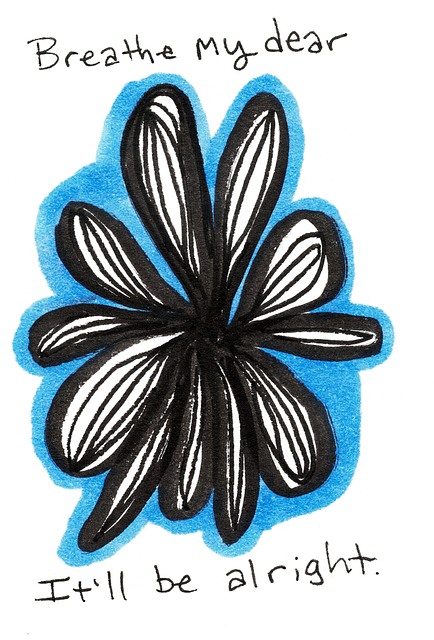Healthcare providers, particularly those in high-stress fields like domestic violence therapy, face burnout due to demanding work environments. Arvada Domestic Violence Therapy addresses this by offering tailored services focusing on inner strength development and stress relief strategies. They prioritize employee well-being through supportive work environments, open communication, team-building activities, mindfulness practices, and peer support networks. By incorporating self-care practices like setting boundaries, regular exercise, and healthy habits, along with conflict resolution techniques and mindfulness meditation, therapists can enhance their resilience and prevent burnout. Continuous training through workshops on stress management and personal growth is crucial for maintaining work-life balance, improving patient outcomes, and fostering a culture of learning within organizations like Arvada Domestic Violence Therapy.
In the demanding field of healthcare, burnout is a prevalent issue affecting providers’ well-being and patient care. This article explores essential strategies to combat burnout among healthcare professionals. We delve into recognizing early warning signs, such as increased stress and decreased job satisfaction, particularly relevant for those in high-pressure settings like Arvada Domestic Violence Therapy. Creating supportive work environments, encouraging self-care practices, providing continuous training, and fostering professional development are key elements to prevent and manage burnout, ensuring healthcare providers can thrive in their careers.
- Recognizing Burnout Signals in Healthcare Providers
- Creating a Supportive Work Environment
- Implementing Effective Self-Care Practices
- Continuous Training and Professional Development
Recognizing Burnout Signals in Healthcare Providers

Healthcare providers often put their patients’ well-being first, dedicating themselves to long hours and demanding situations. However, this commitment can come at a cost – burnout. Recognizing the early signs is crucial. Burnout isn’t just physical exhaustion; it’s a complex state affecting mental and emotional health. Symptoms may include increased irritability, detachment from work, decreased patient satisfaction, and even physical complaints like chronic headaches or insomnia.
At Arvada Domestic Violence Therapy, we understand that healthcare professionals are especially vulnerable to burnout due to the high-stress nature of their work. Our services focus on developing inner strength through conflict resolution techniques designed to manage stress and anxiety relief strategies tailored to individual needs. By addressing these issues proactively, healthcare providers can avoid the pitfalls of burnout, ensuring they remain equipped to deliver compassionate and effective care.
Creating a Supportive Work Environment

A supportive work environment is a cornerstone in preventing burnout among healthcare providers. This includes fostering a culture that prioritises employee well-being and encourages open communication. At Arvada Domestic Violence Therapy, for instance, staff members benefit from regular team-building activities aimed at enhancing collaboration and camaraderie. Such initiatives ensure professionals feel valued and supported, which can significantly mitigate stress levels.
Promoting mental health awareness is another key aspect of cultivating a supportive setting. Encouraging positive thinking through mindfulness practices, therapy sessions, and peer support networks can equip healthcare providers with coping mechanisms for challenging situations. Additionally, implementing community outreach programs that engage both staff and the wider community can foster a sense of purpose beyond clinical duties, contributing to overall job satisfaction and reducing burnout risks.
Implementing Effective Self-Care Practices

Healthcare providers often put their patients’ needs ahead of their own, leading to burnout if self-care isn’t prioritized. Implementing effective self-care practices is essential for maintaining mental and emotional well-being in high-stress professions like domestic violence therapy in Arvada. This involves setting clear boundaries between work and personal life, engaging in regular physical activity, cultivating healthy eating habits, and ensuring adequate sleep. Techniques such as mindfulness meditation and compassion cultivation practices can also help reduce stress and enhance resilience to challenging situations, ultimately preventing burnout.
In addition to these practices, conflict resolution techniques and building confidence are vital tools for domestic violence therapists. Effective conflict management allows professionals to navigate intense emotional scenarios while maintaining their composure and providing quality care. Boosting one’s self-confidence can empower therapists to confront personal challenges and make necessary changes in their work environment, further mitigating burnout risks.
Continuous Training and Professional Development

Healthcare provider burnout is a growing concern, but continuous training and professional development offer a robust solution. Regular workshops focused on stress management techniques can equip medical professionals with tools to navigate high-pressure situations, enhancing their resilience. These sessions can cover topics like mindfulness, time management, and self-care strategies, all vital for maintaining work-life balance, especially in demanding fields such as Arvada Domestic Violence Therapy.
By investing in ongoing education, healthcare providers can stay updated on the latest research, treatment methods, and industry trends, ensuring they deliver optimal patient care. Organizations should prioritize these development opportunities, fostering a culture that values learning and personal growth. This approach not only prevents burnout but also improves patient outcomes by enabling professionals to offer more effective and compassionate care.
Healthcare provider burnout is a growing concern, but by recognizing early signals, fostering supportive work environments, adopting effective self-care practices, and prioritizing continuous training, we can create sustainable solutions. Just as Arvada Domestic Violence Therapy focuses on healing individuals and relationships, these strategies aim to nurture the well-being of healthcare providers, ensuring they can continue to offer quality care for years to come. Through collective efforts, we can prevent burnout and maintain a passionate workforce dedicated to patient welfare.














